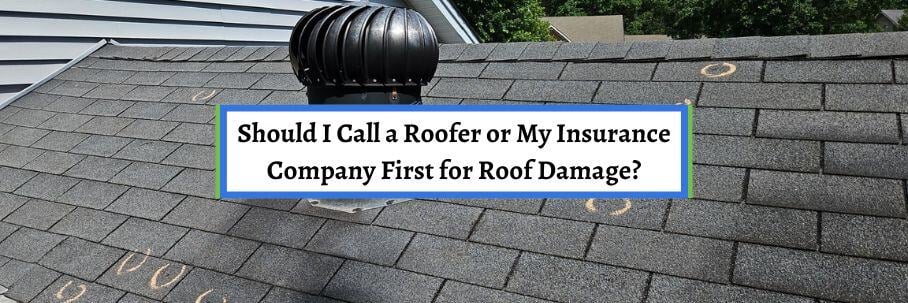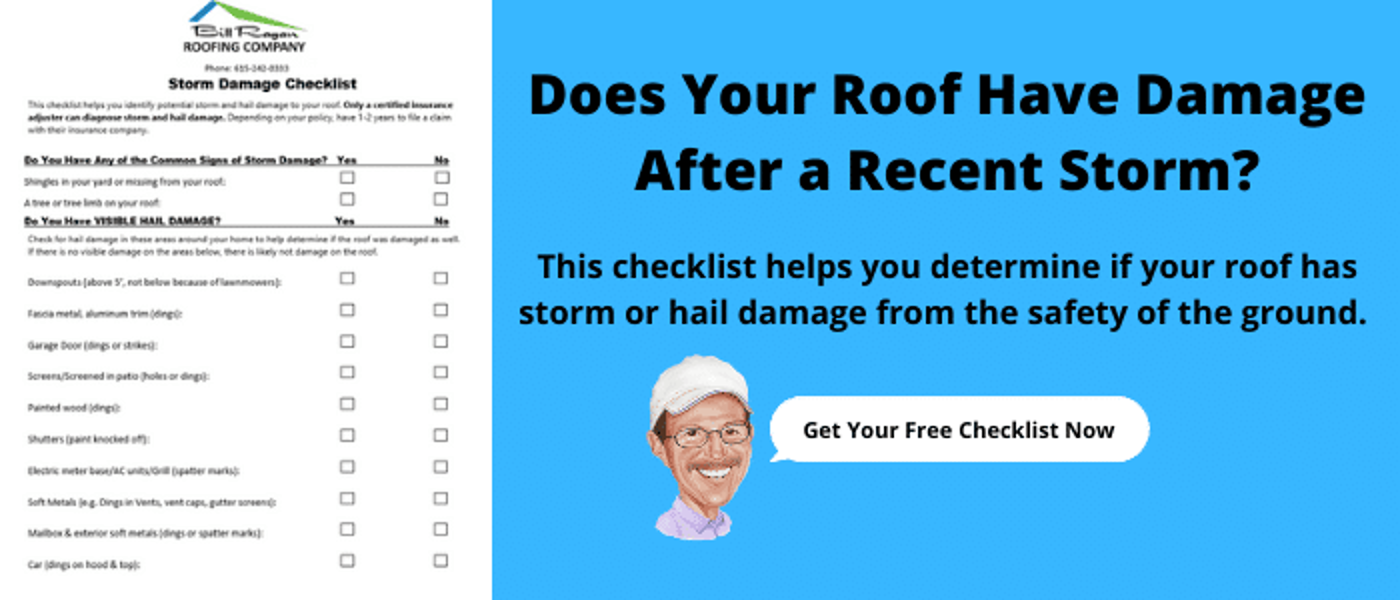Should I Call a Roofer or My Insurance Company First for Roof Damage?

Did your roof just get damaged after a storm? If so, you’re probably wondering who you should call about it.
Do you immediately call a roofing company? Or do you call your insurance company first?
This is a common question, especially for homeowners who have never been through the insurance claim process. Luckily, the answer is pretty straightforward.
For over 30 years, Bill Ragan Roofing has guided homeowners through the confusion, frustration, and stress of dealing with insurance. So, let’s start at the beginning.
Here, you’ll learn who to call first when you realize you have storm damage, plus 4 things every homeowner needs to know before starting the claim process.
Should you call your insurance company or a roofing contractor first for roof damage?
If you think you have roof damage after a storm, the first thing you should do is call your homeowner’s insurance company. Once you give them all the relevant information, what happens next depends on your area and insurance company.
Some insurance companies send an adjuster out to inspect the damage and determine if you have a claim. If they approve your claim, you’ll find a great roofer to start the roof replacement process.
On the other hand, some insurance companies have you schedule a storm damage inspection with a roofer before sending an adjuster out. This is pretty common in the Middle Tennessee area, but you won’t know until reaching out to your insurance company.
No matter what scenario you’ll eventually fall under, the first thing you should always do if you suspect storm damage is to call your insurance company.
4 things you need to know before filing an insurance claim for roof damage
After calling your insurance company, you’ve officially started the claim process. But before picking up the phone, there are some things you need to know.
Let’s dig into 4 things every homeowner needs to know before filing an insurance claim for roof damage.
1. Don’t panic if a roofing company knocks on your door
If your neighborhood is full of door knockers, their only goal is to sell you a roof. These storm chasers are counting on you to overreact and sign a contract after learning your roof is damaged.
The most important thing you should do in this situation is not to panic. There’s no reason for immediate panic if you don’t have an active roof leak, sections of missing shingles, or widespread structural damage.
Also, keep in mind that most insurance policies allow you to file a claim 1 to 2 years after the storm. You obviously need to get it inspected in a timely manner, but you should find a company you trust instead of the first person knocking on your door.
2. The insurance company has all the power to approve your claim
No matter what a roofer finds, your insurance company and their adjuster have all the power to approve your claim. Your roofer can inspect for storm damage, take detailed pictures, mark identifiable storm damage, and advocate for you if they think you have it.
But even if they’re 100% certain you have a viable claim, the insurance adjuster has the final say. Everyone makes mistakes, even insurance adjusters, so there’s always a chance your claim will be wrongly denied.
Luckily, there are ways to double and triple check your roof if you're adamant it has storm damage.
3. Your insurance policy determines the payout you’ll get for a new roof
One of the first things you need to do when contacting your insurance company is review your policy. Not only does it tell you what’s covered and other important information, but it also determines how much of the cost insurance will cover for your new roof.
When looking at your paperwork, you’ll have an Actual Cash Value or Replacement Cost Value policy. Both policies provide a payout, but the amount they provide is very different.
Actual Cash Value policy
An Actual Cash Value (ACV) policy provides a payout for the depreciated value of your roof. With this policy, the insurance company only sends a one-time payment for what your roof is valued at the time of the claim.
This payout will not come close to covering the full cost of a new roof, which leaves you paying for the rest out-of-pocket. Just know that there will be roofers willing to do it for the amount an ACV policy gives you, but this guarantees using cheap materials and labor to reach the low price.
Replacement Cost Value policy
A Replacement Cost Value (RCV) policy is supposed to provide a payout to replace your roof with a brand-new version of itself. After everything is approved, you’ll first get a check for the actual cost value while the insurance company holds the rest back in recoverable depreciation.
Once your new roof is installed and proof that it was done per the claim is provided, you’ll get a second check with the rest of the payout. But remember, the insurance company only pays to restore your old roof to a brand-new version of itself.
This means if you want to upgrade your roof in certain areas, like going from 3-tab asphalt shingles to architectural asphalt shingles, you’ll pay the difference yourself.
4. You must pay your deductible if your roof damage claim is approved
No matter what you hear or what a roofing company says, you must pay your deductible once your insurance claim is approved. Some roofing companies offer to pay deductibles to make the deal sweeter to get the job.
This is not only one of the biggest scams in the roofing industry, but it’s outright committing insurance fraud. Unfortunately, it works because some homeowners jump at the opportunity to avoid paying their deductible.
Saving money where you can is important, but having a roofing company eat your deductible is not worth committing fraud. That’s why you should NEVER listen to a company willing to pay your deductible.
What should you do if your insurance estimate is lower than your roofer’s?
After reading this article, you’re better prepared for the claim process. Remember, your insurance company has all the power to approve your claim.
However, getting the claim approved is just part of the equation if you have an RCV policy. As you already know, an RCV policy means the insurance company is supposed to pay to restore your damaged roof with a brand-new one.
Unfortunately, most insurance estimates will not cover the full cost of a roof replacement by a reputable roofer. Luckily, all hope isn’t lost.
So, what should you do if you find yourself in this situation?
Check out What Should I Do When My Roof Damage Insurance Estimate is Too Low to learn why insurance companies lowball estimates and what you can do about it.


